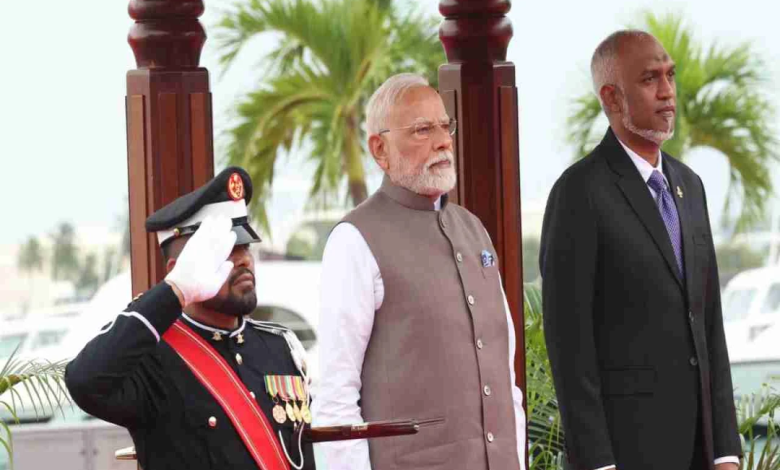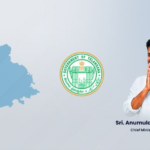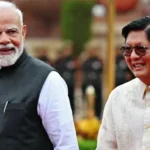Malé: Prime Minister Narendra Modi’s visit to the Maldives has elevated bilateral relations between India and the Maldives to new heights. This visit was not only rich in diplomatic symbolism but also resulted in a series of substantive agreements between the two nations. Attending the Maldives’ 60th Independence Day celebrations as the chief guest, PM Modi reinforced the historical and strategic partnership between the two countries.
India’s Participation in a Historic Occasion
The Maldives, which gained full independence from British control on July 26, 1965, celebrated its diamond jubilee this year. PM Modi’s presence on this occasion also symbolized the 60th anniversary of diplomatic relations between the two nations. From 1887 to 1965, the Maldives’ foreign policy and defense were under British control, but today it stands as an independent nation and a strategic partner of India.
Meetings with the Vice President and Opposition Leaders
PM Modi held separate meetings with Maldives’ Vice President Hussain Mohamed Latheef, Speaker of Parliament Abdul Raheem Abdulla, and former President Mohamed Nasheed. Discussions during these meetings covered critical issues such as trade, energy, climate change, infrastructure, and digital technology. A notable aspect of this visit was Modi’s engagement with opposition leaders, ensuring comprehensive dialogue and political balance in bilateral relations.
Eight Agreements: Focus on Defense, Trade, and Technology
During talks between PM Modi and Maldivian President Dr. Mohamed Muizzu, a total of eight agreements were signed. These agreements spanned diverse areas, including debt relief, a free trade agreement (FTA), fisheries, aquaculture, digital transactions, pharmacopoeia, and the expansion of India’s UPI technology.
The inauguration of a new building for the Ministry of Defense in Malé was also part of this visit, symbolizing India-Maldives defense cooperation. Additionally, PM Modi presented a sapling to the Maldives under the ‘One Tree in Mother’s Name’ campaign, representing environmental collaboration between the two nations.
India’s Defense Cooperation: 72 Vehicles Donated to Maldives
India gifted 72 military vehicles to the Maldives National Defense Force (MNDF). This cooperation stems from discussions between Defense Minister Rajnath Singh and his Maldivian counterpart, Mohamed Ghassan Maumoon. This military assistance is not merely symbolic but a concrete step toward strengthening the Maldives’ defense capabilities.
On this occasion, PM Modi handed over the vehicles to President Muizzu by presenting a symbolic key. This gesture sent a clear message that India is not just a neighbor but also a strategic ally of the Maldives.
PM Modi’s Message: India Has Always Stood By
In his address, PM Modi stated, “India-Maldives relations are not just based on geographical proximity but on deep trust, cooperation, and shared values.” He expressed pride in India being the Maldives’ most reliable friend, whether during the pandemic or economic crises—be it supplying essential goods or providing financial assistance.
Fluctuations in Relations and the Path to a New Balance
India-Maldives relations have seen several ups and downs in recent years. Tensions arose in 2023 when Muizzu won the election with the backing of the ‘India Out’ campaign. Despite this, a meeting between Modi and Muizzu at the COP-28 summit in Dubai in December 2023 marked the beginning of a reset in ties.
However, early 2024 saw a ‘Boycott Maldives’ campaign in India following derogatory remarks by some Maldivian ministers about PM Modi and his Lakshadweep visit. Despite this, leaders from both nations maintained dialogue, and Muizzu requested the withdrawal of Indian military personnel by May 2024. India complied, replacing troops with technical experts.
A New Chapter in Economic Cooperation
During Muizzu’s visit to India in October 2024, India provided the Maldives with a $
Maldives’ Independence Day celebrations
Maldives’ Independence Day, celebrated on **July 26**, commemorates the nation’s freedom from British colonial rule in **1965**. The day is marked with vibrant festivities, including parades, cultural performances, and flag-hoisting ceremonies, reflecting national pride and Maldivian heritage. The celebrations also honor the country’s transition to a republic in **1968**, ending centuries of sultanate rule.
Ministry of Defense in Malé
The Ministry of Defense in Malé is the central government body responsible for the defense and security of the Maldives. Located in the capital city, it oversees the Maldives National Defence Force (MNDF), which was formally established in 2006, though its origins trace back to the Maldivian militia created in the 19th century. The ministry plays a key role in national security, disaster response, and maritime surveillance in the strategically important Indian Ocean region.
Maldives National Defense Force (MNDF)
The Maldives National Defense Force (MNDF) is the unified military organization responsible for the defense and security of the Maldives. Established in 1892 as a small security force under the monarchy, it evolved into its current form in 2006, combining the former National Security Service and the Coast Guard. The MNDF plays a key role in maritime surveillance, disaster response, and maintaining national stability.
India’s UPI technology
India’s Unified Payments Interface (UPI) is a real-time payment system launched in 2016 by the National Payments Corporation of India (NPCI). It enables instant money transfers between bank accounts via mobile apps, revolutionizing digital payments in India by making transactions fast, secure, and accessible. UPI has become a global model for fintech innovation, driving India’s shift toward a cashless economy with over 10 billion monthly transactions.
One Tree in Mother’s Name campaign
The *”One Tree in Mother’s Name”* campaign is an environmental and cultural initiative that encourages people to plant trees in honor of their mothers, combining love and respect for maternal figures with ecological conservation. Originating in India, the campaign was inspired by traditional practices of tree planting as a symbol of life and gratitude, while also addressing modern concerns like deforestation and climate change. By linking familial bonds with environmental action, the movement fosters sustainability and cultural reverence for motherhood and nature.
Lakshadweep
Lakshadweep is a tropical archipelago of 36 coral islands in the Arabian Sea, off the southwestern coast of India. Known for its pristine beaches, rich marine life, and vibrant coral reefs, it has a history influenced by Buddhist, Hindu, and later Islamic cultures, with the islands coming under Muslim rule in the 14th century. Today, it is India’s smallest Union Territory, celebrated for its unique cultural heritage and eco-tourism.
COP-28 summit in Dubai
The **COP-28 summit**, held in **Dubai, UAE, in November–December 2023**, was the 28th annual United Nations Climate Change Conference. It brought together global leaders to address climate action, with key outcomes including the first-ever agreement to transition away from fossil fuels. The event highlighted Dubai’s role as a hub for international diplomacy and sustainable development initiatives.
Boycott Maldives campaign
The “Boycott Maldives” campaign emerged in early 2024 as a social media-driven movement urging travelers to avoid the Maldives following derogatory remarks made by Maldivian officials against India and Prime Minister Narendra Modi. The backlash intensified after Modi promoted Lakshadweep, an Indian archipelago, as an alternative tourist destination, leading to a surge in canceled bookings to the Maldives. The campaign highlighted geopolitical tensions and the economic reliance of the Maldives on Indian tourists, who were among its largest visitor groups.






